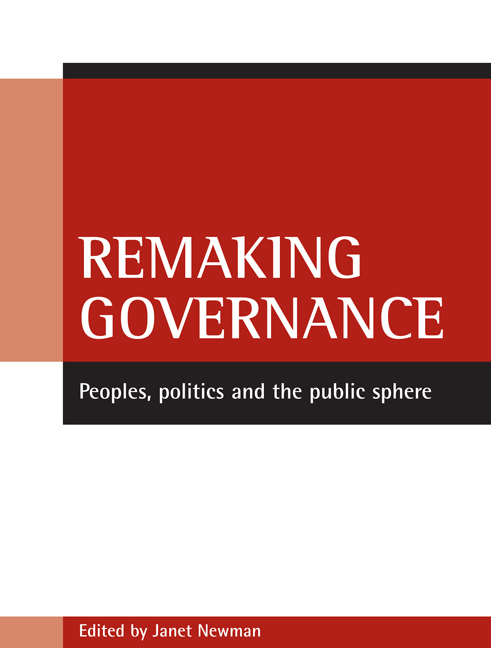Book contents
- Frontmatter
- Contents
- List of tables and figures
- Acknowledgements
- Notes on contributors
- Introduction
- one Reconstituting Europe: governing a European people?
- two Governance and the constitution of a European social
- three Remaking European governance: transition, accession and integration
- four Regendering governance
- five Welfare governance and the remaking of citizenship
- six Participative governance and the remaking of the public sphere
- seven Promoting democratic governance through partnerships?
- eight Among everyday makers and expert citizens
- nine Governance and the transformation of political representation
- Conclusion
- Index
Introduction
Published online by Cambridge University Press: 18 January 2022
- Frontmatter
- Contents
- List of tables and figures
- Acknowledgements
- Notes on contributors
- Introduction
- one Reconstituting Europe: governing a European people?
- two Governance and the constitution of a European social
- three Remaking European governance: transition, accession and integration
- four Regendering governance
- five Welfare governance and the remaking of citizenship
- six Participative governance and the remaking of the public sphere
- seven Promoting democratic governance through partnerships?
- eight Among everyday makers and expert citizens
- nine Governance and the transformation of political representation
- Conclusion
- Index
Summary
‘Modernisation’, ‘globalisation’ and ‘privatisation’ are each terms that signal profound shifts in the process of governance. Across Western Europe governments are seeking to dismantle the contract between state and citizen that was inscribed in the social democratic welfare state and to build a more ‘modern’ contract based on responsibility and choice. Governmental power is both retreating – with state institutions being slimmed down, ‘hollowed out’, decentred and marketised – and expanding, reaching into more and more of citizens’ personal lives: for example, their decisions about work, health and parenting. At the same time, actors – partnership groups, community organisations and citizens themselves – are being ‘empowered’ by those same policy reforms and new political spaces potentially opened up.
This dynamic – the remaking of peoples and publics as both the object of governance but also as the subjects of new forms of agency – forms a central focus of this book. It brings together a number of authors whose work is opening up critical forms of analysis and debate in social policy, public policy and political science. Originating as a way of capturing shifts in the character of political rule, governance as a concept has been stretched to encompass a range of different transformations, including the increasing emphasis on ‘governing the social’: drawing citizens and communities into the process of collaborative governance and constituting new forms of governable subject. However, governance theory tends to conceptualise the social through frameworks in which governance forms the primary analytical concept and the social a residual category. The social is viewed as something defined by its ‘otherness’ to the state and economy, as an entity to be governed, a resource to be mobilised or the site of social reproduction. The result tends to be a ‘thin’ conception of the social (Newman, 2004). In this book we draw on strands of social and cultural theory that view governance as meaning-making as well as institutional practice; that contest the image of the social actor as a rational resource-maximising individual; and that offer critical perspectives on ways in which ‘the people’ who are to be governed and the ‘public’ domain of governmental activity are understood. We highlight ways in which new governance relationships and practices may reshape patterns of identity and belonging.
- Type
- Chapter
- Information
- Remaking GovernancePeoples, Politics and the Public Sphere, pp. 1 - 16Publisher: Bristol University PressPrint publication year: 2005
- 1
- Cited by



